Students can Download Chapter 7 Fractions Ex 7.4 Questions and Answers, Notes Pdf, KSEEB Solutions for Class 6 Maths helps you to revise the complete Karnataka State Board Syllabus and score more marks in your examinations.
Karnataka State Syllabus Class 6 Maths Chapter 7 Fractions Ex 7.4
Question 1.
Write shaded portion as fraction. Arrange them in ascending and descending order using correct sign ‘<‘, ‘=’, ‘>’ between the fractions:-
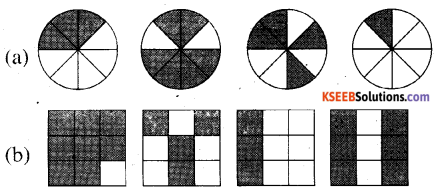
c) Show \(\frac{2}{6}\), \(\frac{4}{6}\), \(\frac{8}{6}\) and \(\frac{6}{6}\) on the number line. Put appopriate signs between the fractions given.

a) * Here, 1st circle represents 3 shaded parts out of 8 equal parts. Therefore, it represents a fraction \(\frac{3}{8}\)
* Here, 2nd circle represents 6 shaded parts out of 8 equal parts. Therefore, it represents a fraction \(\frac{6}{8}\)
* Here, 3rd circle represents 4 shaded parts out of 8 equal parts. Therefore, it represents a fraction \(\frac{4}{8}\)
* Here, 4th circle represents 1 shaded parts out of 8 equal parts. Therefore, it represents a fraction \(\frac{1}{8}\)
Now, these fractions may be arranged as

b) * Here, 1st square represents 8 shaded parts out of 9 equal parts Therefore, it represents a fraction \(\frac{8}{9}\)
* Here, 2nd square represents 4 shaded parts out of 9 equal parts Therefore, it represents a fraction \(\frac{4}{9}\)
* Here, 3rd square represents 3 shaded parts out of 9 equal parts Therefore, it represents a fraction \(\frac{3}{9}\)
* Here, 4th square represents 6 shaded parts out of 9 equal parts Therefore, it represents a fraction \(\frac{6}{9}\)
Now, these fractions can be arranged as

c) To represent the given fraction
\(\frac{2}{6}\), \(\frac{4}{6}\), \(\frac{8}{6}\) and \(\frac{6}{6}\) on number line, each unit length should be succeed in 6 equal parts Now, these fractions can be represented as.
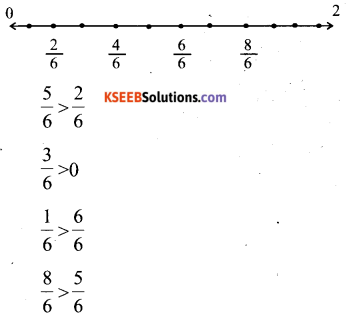
![]()
Question 2.
Compare the fractions and put an appropriate sign.
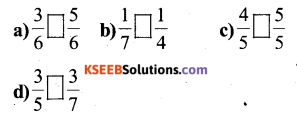
Solution:

Here, the denominator are same, Therefore, The fraction having the greater numerator will be greater.
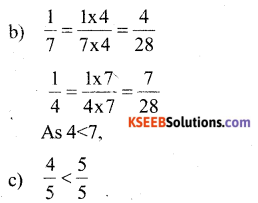
Here, the denominators are same, Therefore the fraction having the greater numerator will be greater

![]()
Question 3.
Make five more such pairs and put appropriate signs.
Solution:

Question 4.
Look at the figures and write ‘<’ or ‘>% ‘=’ between the given pairs of fractions.
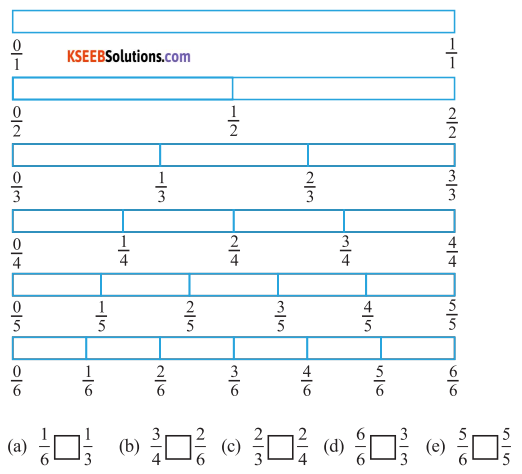
Solution:
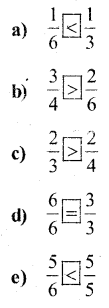
Question 5.
How quickly can you do this? Fill appropriate sign( ‘<% ‘=’, ‘>’)

Solution:



![]()







![]()
Question 6.
The following fractions represent just three different numbers. Separate them into three groups of equivalent fractions, by changing each one to its simplest form.

Solution:
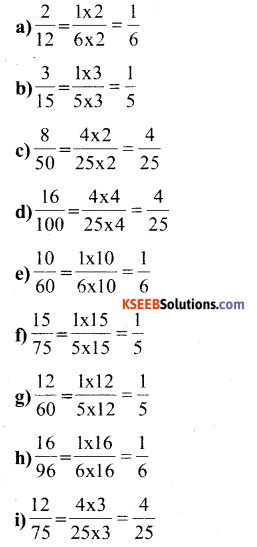
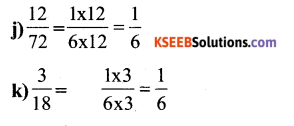
l) \(\frac{4}{25}\) = there are 3 groups of equivalent fractions
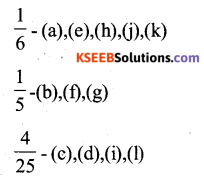
Question 7.
Find answers to the following. Write and indicate how you solved them.
Solution:
a) Is \(\frac{5}{9}\) equal to \(\frac{4}{5}\)?
Converting these into like fractions,
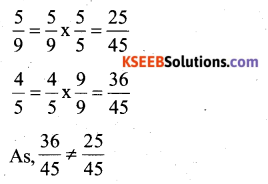
Therefore, \(\frac{5}{9}\) is not equal to \(\frac{4}{5}\)
b) Is \(\frac{9}{16}\) equal to \(\frac{5}{9}\) ?
Converting these into like fractions,
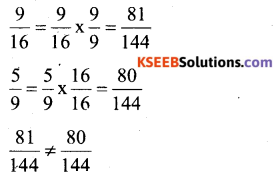
Therefore, \(\frac{9}{16}\) is not equal to \(\frac{5}{9}\)
c) Is \(\frac{4}{5}\) equal to \(\frac{16}{20}\)?
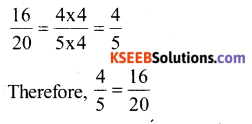
d) Is \(\frac{1}{15}\) equal to \(\frac{4}{30}\)?

Therefore, \(\frac{1}{15}\) is not equal to \(\frac{4}{30}\)
![]()
Question 8.
Ila read 25 pages of a book containing 100 pages, Lalita read \(\frac{2}{5}\) of the same book. Who read less?
Solution:
Numbers of pages read by Lalita =
\(\frac{2}{5} \times 100=40\)
Number of pages read by Ila = 25
Hence, Ila has read less number of pages
Question 9.
Rafiq exercised for \(\frac{3}{6}\) of an hour, while Rohit exercised for \(\frac{3}{4}\) of an hour Who exercised for a longer time?
Solution:
Rafiq exercised for \(\frac{3}{6}\) hr and Rohit exercised for \(\frac{3}{4}\) hr converting these into like fractions.
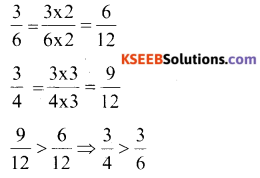
Hence, Rohit exercised for a longer time.
![]()
Question 10.
In a class A of 25 students 20, passed in first class; in another class B of 30 students, 24 passed in first class. In Which class was a greater fraction of students getting first class?
Solution:
Fraction of students of class A who passed in 1st class = \(\frac{20}{25}=\frac{4}{5}\)
Fraction of student of class B Who passed in 1st class = \(\frac{24}{30}=\frac{4}{5}\)
From both classes, an equal fraction of student passed in first class